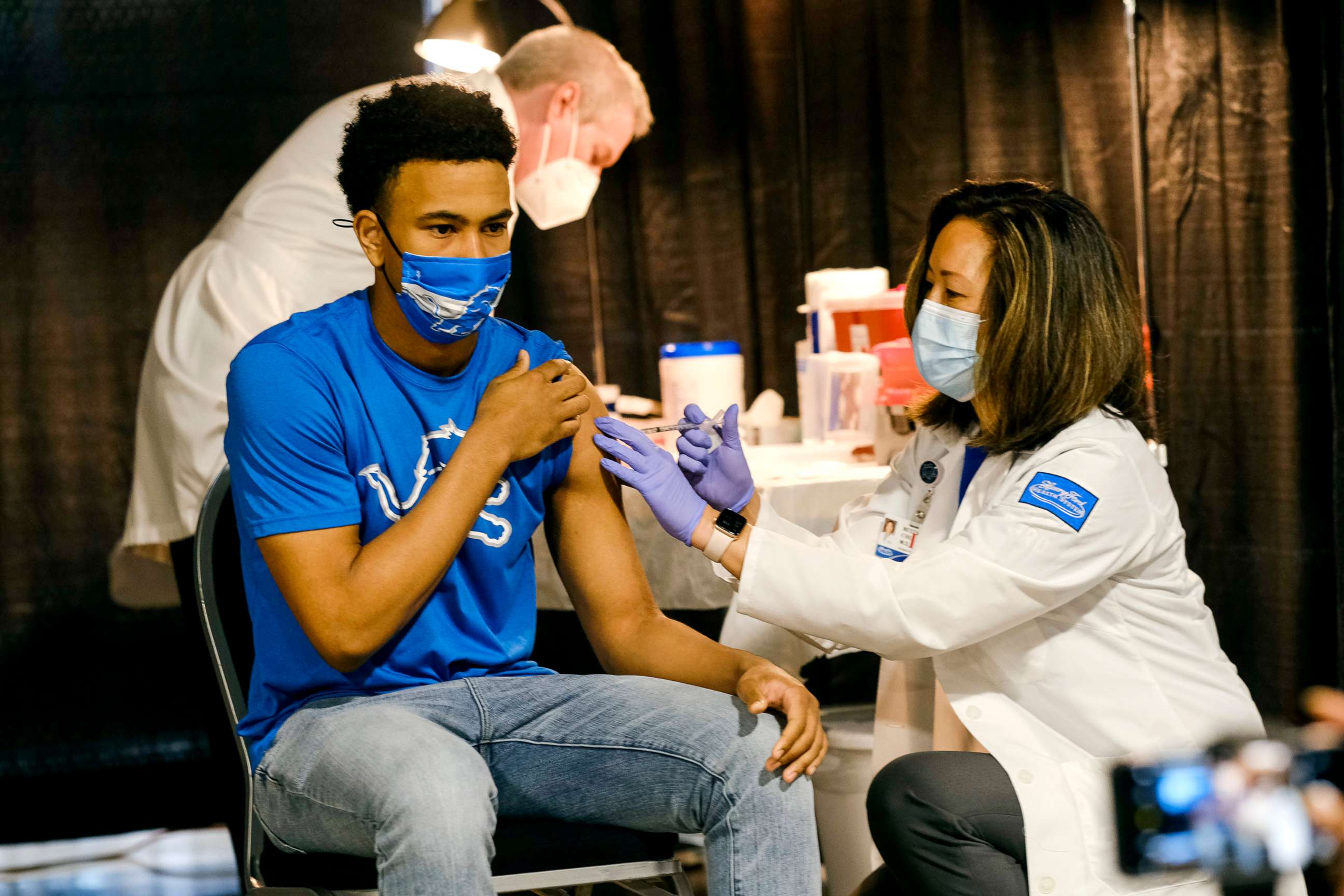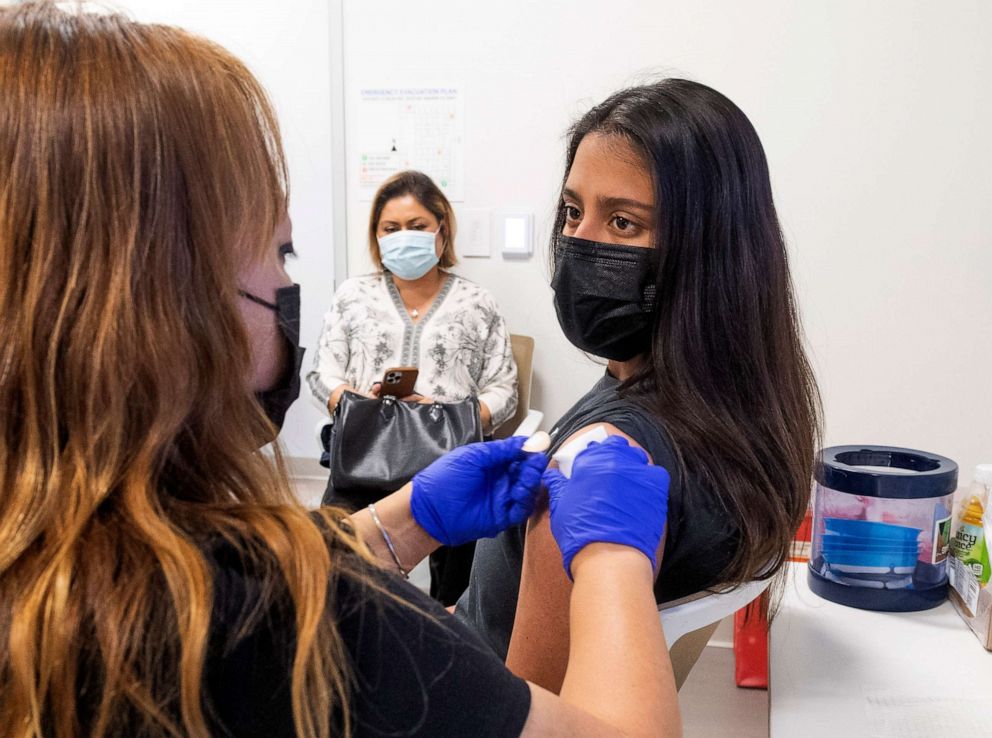What's fueling COVID-19 vaccine hesitancy in young adults?
One barrier is a "youthful sense of invincibility."
Starting next week, 150 Connecticut college students will begin training to go out into communities in their state that are lagging in vaccination rates and try to combat COVID-19 vaccine hesitancy among young adults.
The program comes as the nation enters a period where the delta variant is surging in some locations and officials are having difficulty convincing millions of Americans to get vaccinated -- currently the best hope of averting yet another wave of COVID-19.
Officials nationwide are trying to reach unvaccinated people -- in particular those between the ages of 18 and 24, who have lower rates of getting the shot when compared to older age groups and the highest rates of COVID-19 cases.
"It really is meeting people where they are, giving them the important information for them to be able to make the decision for themselves," Janelle Chiasera, dean of the School of Health Sciences at Quinnipiac University, which is working with the state health department on the Connecticut Public Health College Corps program, told ABC News. "What we're trying to do is to get those people who are on the fence, over that fence to get the vaccine."
Unvaccinated adults are "significantly younger," according to the Kaiser Family Foundation's latest vaccine monitor report; 29% of the unvaccinated are 18- to 29-year-olds, compared to 17% of those vaccinated, for the smallest percentage of adults vaccinated.
According to the Centers for Disease Control and Prevention, 41.8% of Americans ages 18 to 24 are fully vaccinated, compared to 66% of those ages 50 to 64 and 80.9% of those ages 65 to 74.
The reasons are myriad, including fear of side effects, but experts stress the need to overcome that hurdle through targeted and trusted messaging.
"The more unvaccinated people you have, the more the chances that we're setting up this virus to be able to create another variant," Chiasera said. "We are allowing that virus to get smarter."
Concerns about side effects
The reasons behind the reluctance are varied and not fully known. One may be the "lingering effects" of not prioritizing younger populations during the initial vaccine rollout, Dr. Monica Schoch-Spana, a senior scholar at the Johns Hopkins Center for Health Security and co-leader of CommuniVax, a national rapid research coalition focused on improving vaccine equity in Black, Hispanic/Latino and Indigenous communities, told ABC News.
A new study by University of California San Francisco researchers published in the Journal of Adolescent Health this week found that about 1 in 4 unvaccinated people between the ages of 18 and 25 said that they "probably will not" or "definitely will not" get the COVID-19 vaccine.
"There's still that lingering perception that 'I am young, I am strong, I can fight this thing off,'" Schoch-Spana said. "So there's that youthful sense of invincibility that was reinforced early on when we had less vaccine available."
Older adults and those with underlying conditions diagnosed with COVID-19 generally fared dramatically worse than those who were younger -- more than 95% of deaths were in those 50 and older, according to CDC data

Others are worried about potential side effects of the vaccine. A CDC report published last month found that one of the main reasons U.S. adults between the ages of 18 and 39 were not vaccinated were due to concerns about possible side effects. The UC San Francisco study found that was a concern for more than half of respondents. Neither study specified what those concerns were.
In a survey of patients at its California sites last month, COVID-19 testing and vaccination startup Curative also found that the number one reason people hadn't gotten vaccinated until that point was due to concerns about side effects, according to Alexandra Simon, director of vaccines for the state.
"It could mean that they're worried that they're gonna have to miss work, they're worried about cab fare, or they're just kind of worried about getting sick," Simon told ABC News. "I think there's a ton of misinformation floating around about side effects."
Chiasera said she has also heard concerns about blood clots and "fertility issues in women."
The single-dose Johnson & Johnson vaccine has been associated with an extremely rare but severe blood clot disorder and, more recently, a rare neurological disorder called Guillain-Barre.
Experts and public health officials maintain that any risks from the vaccine are outweighed by the benefits. The vast majority of side effects are mild, and long-term side effects are "unlikely," according to the CDC. Additionally, researchers have found that there's a greater risk of developing clots from COVID-19 than from the vaccines.
Meanwhile, there is no evidence that any vaccines, including the COVID-19 vaccines, affect fertility in women or men, according to the CDC.
'No sole, single identity'
More education could help with vaccination efforts. The CDC report on vaccination in young adults found that about two-thirds of respondents who were not sure about getting vaccinated reported they didn't have adequate information about vaccine safety or effectiveness.
"There's a lot that we see on social media about vaccines, but not a lot that people really truly understand about them," Chiasera said.
Through Connecticut Public Health College Corps, the trained students will attend vaccine clinics, community efforts and do other outreach over the course of four weeks and be there to answer people's questions on topics like the availability, safety and efficacy of the vaccines and side effects, Chiasera said.
"We're realists in knowing that there are people -- it doesn't matter what you say, it doesn't matter what you do -- they're not going to get their vaccine, but that is a small percent," she said. "There's a lot more people that are on the fence, and I think our best efforts are really on those people that are on the fence -- that really truly have questions that they need answered to help make that decision."
As much attention is being paid to reaching unvaccinated young adults, vaccination is a hyperlocal effort that can't be generalized, Schoch-Spana said.
"One can't expect some magic bullet to get everybody between the ages of 18 and 28 showing up in large numbers," she said. "You really do have to think about, OK, if I want to target college-aged kids, what should I be doing? If I wanted to target Spanish-speaking youth, where do I need to go?"
"There's no sole, single identity, so a youth-oriented vaccination campaign has to think about the different kinds of youths that are out there and to develop very specific communication approaches, outreach approaches and delivery locations to meet youth where they are," she added.

'Trusted influencers' needed
It largely boils down to trust, and who the "trusted influencers" are, Schoch-Spana said.
Through its research, she said, CommuniVax has seen that in Black communities in rural Alabama, grandparents are the ones advocating for their grandchildren to get vaccinated; meanwhile, in Hispanic/Latino communities in rural Idaho, the younger generation is helping grandparents get shots.
"Different age groups have different levels of influence, according to where they are in their family and also the larger community," she said.
In its survey of its California vaccination sites, Curative found that one reason why someone who was previously hesitant to get vaccinated ultimately did was because "someone I trust convinced me."
A majority of patients at its California vaccination sites came based on referrals, most of which were from people who had been vaccinated at the site, Curative learned. After realizing that, they started a program dubbed "Vax Tripling," based on the political organizing concept of vote tripling.
"It's the idea that every person who commits to vote, you also ask them which three people they can talk to about voting," Simon said. "So it's kind of leveraging that trusted messenger network that happens organically."
To further spur referrals, Curative created business cards with information about the site for patients to give to those in their community to turn "every person who chooses to get vaccinated into an ambassador for vaccination in general, in a way that is authentic to the community and real to their relationships," Simon said.




